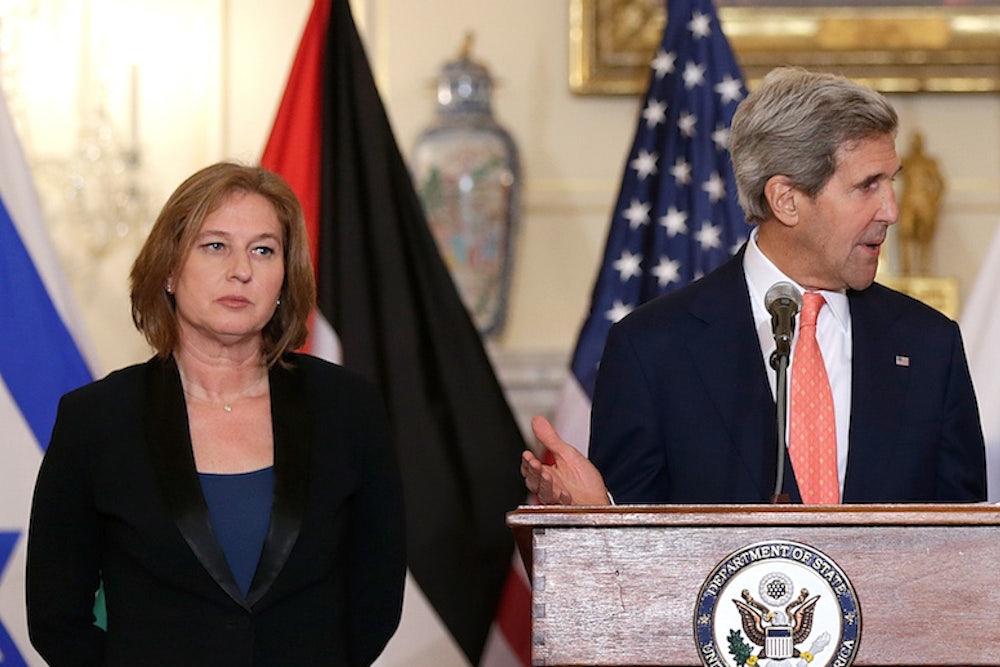Secretary of State John Kerry, who has invested a tremendous amount of time and effort over the past year and change in the sickly Israeli-Palestinian peace process, told a group of “influential world leaders” at the Trilateral Commission that Israel was headed for “apartheid” if a two-state solution is not achieved.
The use of the a-word, reported by The Daily Beast, conjures not only a system universally and correctly condemned as abhorrent, but a model of government that justified precisely the kind of boycotts, divestments, and sanctions that the BDS movement favors and whose cure was a single democratic state. A State Department spokesperson clarified that Kerry was speaking of a possible future, not the existing present.
Should Kerry have said it? And is he right?
Kerry’s chief, self-appointed task is to move along a peace process that has wheezed on for nine months—its initial deadline is tomorrow. It has seemed increasingly moribund since the beginning of this month, when Israel hedged on releasing an agreed-to final round of prisoners, prompting the Palestinian Authority to submit membership bids to several international organizations, prompting Israel not to release the prisoners. Last week, the P.A. and Hamas reconciled for the third time in four years, a virtual poison pill given Hamas’ unreconstructed formal opposition towards Israel’s existence.
The United States will never be an “honest broker” in the peace process. And that’s actually a good thing, because reaching a deal will require Israel to make material concessions from a position of strength (The New York Times’ Roger Cohen put it best last week in a column called, “Israel’s Sustainable Success”). Israel is more likely to do this precisely if its best friend, the world’s superpower, is on its side.
During his tenure, Kerry has taken the tack of trying to be a good friend to Israel by speaking honestly to Israel, appealing not only to the better but also the savvier angels of its nature. Here is his full quote, according to The Daily Beast:
A two-state solution will be clearly underscored as the only real alternative. Because a unitary state winds up either being an apartheid state with second-class citizens—or it ends up being a state that destroys the capacity of Israel to be a Jewish state. Once you put that frame in your mind, that reality, which is the bottom line, you understand how imperative it is to get to the two-state solution, which both leaders, even yesterday, said they remain deeply committed to.
Minus the a-word, this is standard center-left, centrist, and even center-right American opinion. Yet it is necessarily different when it is the secretary of state instead of your nephew at the Seder table saying it. And Kerry has gone down this route before, and it hasn’t worked. In January, he noted the “delegitimization” campaigns around the world, and the Israeli right accused him of abetting those campaigns. Earlier this month, he appeared to lay primary blame on Israel for the peace talks’ breakdown, and Prime Minister Benjamin Netanyahu’s office pounced again. In other words, there might be more effective ways for Kerry to deploy vinegar instead of honey here.
Although prominent Israelis, such as two former prime ministers named Ehud, have used the a-word, Kerry should know that for the current government it’s a conversation-ender. In fact, he almost certainly does know that, which is why he only said it privately. That was pretty clearly botched, then. Kerry’s once-high secretary of state stock seems to fall by the day.
As to whether Israel is on its way to becoming an apartheid state, there are as many answers as there are Internet connections. Call up any given expert and you are liable to get any kind of response. (I did once call a South African-born Jewish expert on South Africa who told me he rejects the analogy, but doubtlessly I could find a South African-born Jewish expert on South Africa who affirms it.) A good thing to note is that the question itself is semantically confusing. Apartheid is the Afrikaans word for South Africa’s style of government from 1948 to 1994—it translates most literally as “apart-hood.” To ask if Israel is becoming an apartheid state is really to ask how valid the analogy is to South Africa, and that analogy is ripe for multiple interpretations.
It is probably more fruitful to talk about what we can safely say Israel is. It’s an explicitly Jewish democracy, in most ways a vibrant one, but whose status as such, whose moral fiber, and whose strategic position both globally and domestically is threatened by a militarily backed project of colonizing parts of the West Bank, where it administers different legal systems depending on whether you are Israeli or Palestinian. This project has lasted a year longer than apartheid did in South Africa, and shows no immediate signs of ending. Is it apartheid? Maybe we should call it kibush, which is Hebrew for “occupation.”
